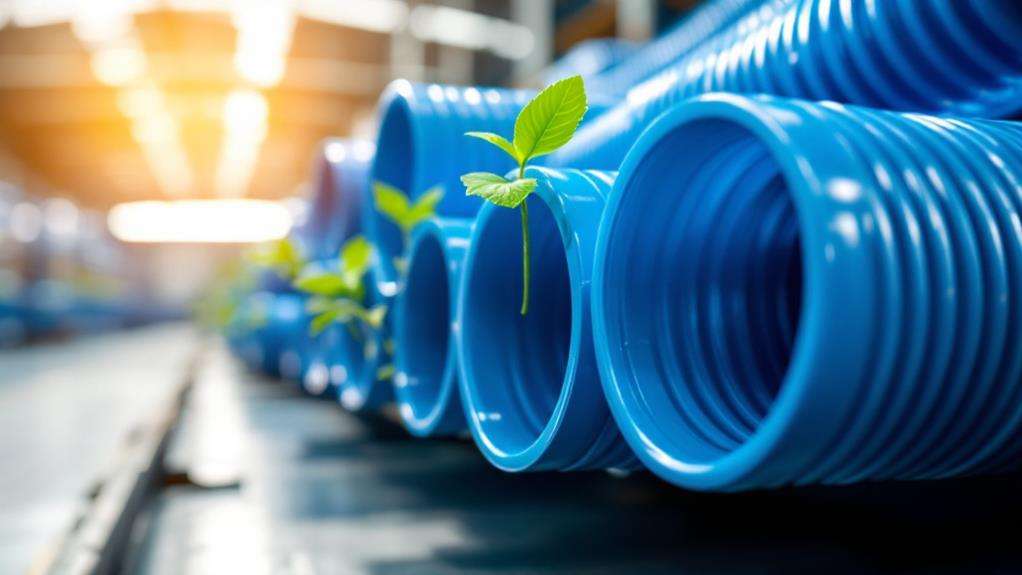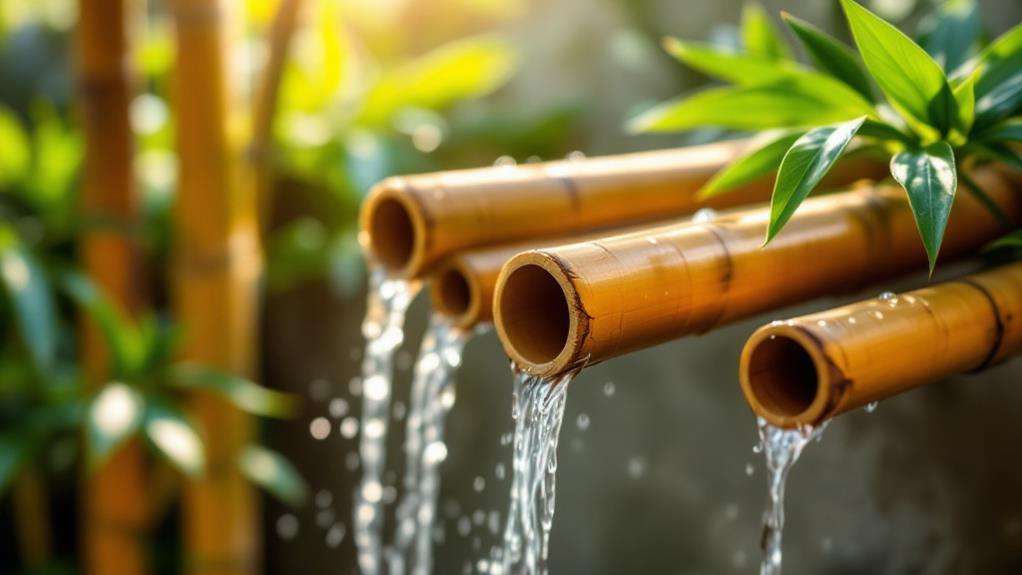Eco-Friendly Pipe Options for Green Plumbing
When choosing eco-friendly pipes for green plumbing, you've got several great options. PEX systems offer excellent insulation and energy savings, while copper pipes are durable and 100% recyclable. HDPE pipes provide thermal efficiency and corrosion resistance, and polypropylene solutions boast exceptional durability with leak-free connections. For a unique approach, consider bamboo-based alternatives, which are naturally resistant to bacteria and fungi. Each option has its own set of benefits, from reducing energy costs to minimizing waste and environmental impact. By exploring these sustainable piping materials, you'll be well-equipped to make an informed decision for your green plumbing project.
PEX Piping Systems
When you're considering eco-friendly plumbing options, PEX piping systems should be at the top of your list. PEX, or cross-linked polyethylene, offers numerous advantages over traditional copper or PVC pipes. Its flexibility and durability make it an excellent choice for both new construction and retrofitting projects.
One of the key benefits of PEX is its thermal efficiency. The material has excellent insulation properties, which helps reduce heat loss in hot water lines and prevents condensation on cold water pipes. This translates to energy savings and improved overall efficiency in your home's plumbing system.
Installation benefits are another reason to choose PEX. The flexible nature of the pipes allows for fewer connections and fittings, reducing the potential for leaks. It's also lighter and easier to handle than metal pipes, making installation quicker and less labor-intensive. PEX can be installed using a variety of methods, including crimp, clamp, or expansion fittings, giving plumbers more options to work with in different scenarios.
PEX is resistant to scale buildup and corrosion, ensuring a longer lifespan and maintaining water quality. It's also freeze-resistant, reducing the risk of burst pipes in cold climates.
Copper: A Recyclable Classic
Despite the rise of newer materials, copper remains a popular choice in eco-friendly plumbing due to its recyclability and longevity. You'll find that copper pipes have been a staple in plumbing systems for decades, and for good reason. Their corrosion resistant properties make them ideal for both hot and cold water applications, ensuring your pipes won't degrade or contaminate your water supply over time.
Copper's durable construction means you won't need to replace your pipes as frequently as you might with other materials. This longevity translates to less waste and fewer resources used over the life of your plumbing system. When it's time to upgrade or remove copper pipes, you'll be pleased to know that they're 100% recyclable. This means the material can be repurposed indefinitely without losing its quality or properties.
While copper pipes may have a higher upfront cost compared to some alternatives, their long-term benefits often outweigh this initial investment. You'll also appreciate copper's natural antimicrobial properties, which can help prevent the growth of harmful bacteria in your plumbing system. When considering eco-friendly plumbing options, don't overlook the enduring value of copper.
HDPE Pipes

In recent years, High-Density Polyethylene (HDPE) pipes have emerged as a strong contender in the eco-friendly plumbing market. These durable pipes offer numerous benefits that make them an attractive option for environmentally conscious homeowners and builders.
HDPE pipes boast excellent thermal efficiency, which helps reduce energy loss in hot water systems. This means you'll use less energy to heat your water, lowering both your carbon footprint and utility bills. Additionally, their corrosion resistance guarantees a longer lifespan compared to traditional metal pipes, reducing the need for frequent replacements and minimizing waste.
You'll appreciate HDPE pipes' flexibility, which allows for easier installation and fewer joints. This characteristic not only saves time during construction but also reduces the risk of leaks. HDPE pipes are also lightweight, making transportation and handling more energy-efficient.
When it comes to environmental impact, HDPE pipes shine. They're 100% recyclable and can be repurposed into new pipes or other plastic products at the end of their useful life. In addition, their production process requires less energy compared to metal pipe manufacturing, contributing to a smaller carbon footprint from the start.
Polypropylene Piping Solutions
Along with HDPE pipes, polypropylene (PP) piping solutions have gained traction in the green plumbing industry. PP pipes offer exceptional durability advantages, making them an attractive option for eco-conscious homeowners and builders. These pipes are resistant to corrosion, chemical leaching, and scale buildup, ensuring a longer lifespan and reduced need for replacements.
When considering PP piping for your plumbing needs, you'll find several benefits that contribute to cost-effective installations:
- Lightweight materials that are easy to handle and transport
- Heat fusion joining techniques that create leak-free connections
- Flexibility that allows for fewer fittings and faster installation
- Compatibility with existing plumbing systems for seamless integration
PP pipes are also known for their excellent thermal insulation properties, which can help reduce energy costs associated with hot water distribution. Additionally, they're 100% recyclable, further enhancing their eco-friendly credentials.
While the initial cost of PP piping may be higher than traditional materials, the long-term savings in maintenance and energy efficiency often outweigh this upfront investment. By choosing PP pipes, you're not only investing in a durable and efficient plumbing system but also contributing to a more sustainable future for your home and the environment.
Bamboo-Based Plumbing Alternatives

While synthetic materials like polypropylene offer numerous benefits, nature provides its own eco-friendly plumbing solution: bamboo. You'll find that sustainable bamboo tubing is gaining traction as an innovative alternative in green plumbing systems. This versatile plant grows rapidly, requires minimal water, and absorbs more carbon dioxide than traditional materials.
When you're considering bamboo-based plumbing alternatives, you'll uncover that they're not only environmentally friendly but also durable and cost-effective. Bamboo pipes are naturally resistant to bacteria and fungi, reducing the need for chemical treatments. They're also lightweight, making installation easier and less labor-intensive.
You can incorporate bamboo plumbing fixtures in various applications, from water supply lines to drainage systems. These fixtures are often treated with natural resins to enhance their water resistance and longevity. While bamboo isn't suitable for all plumbing scenarios, it's an excellent option for low-pressure systems and outdoor applications.
